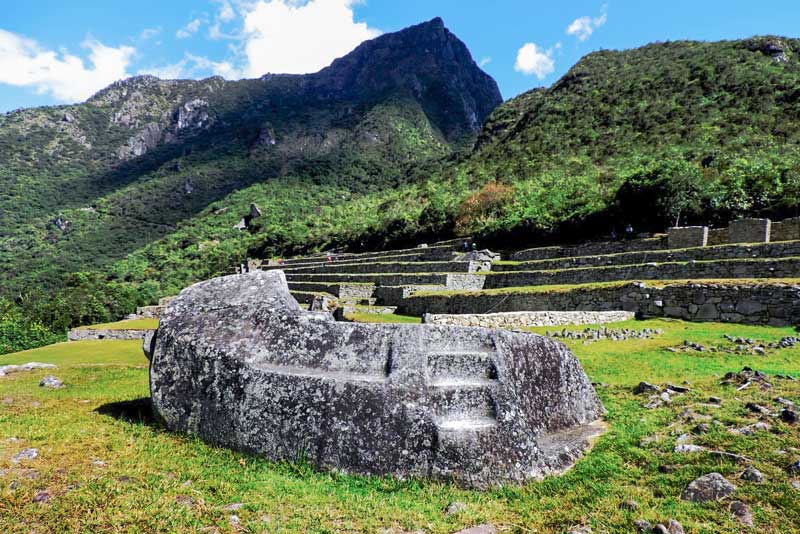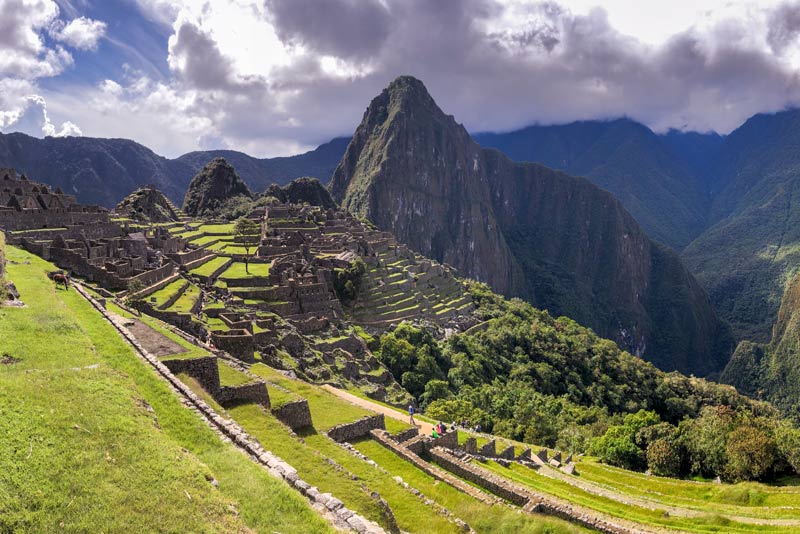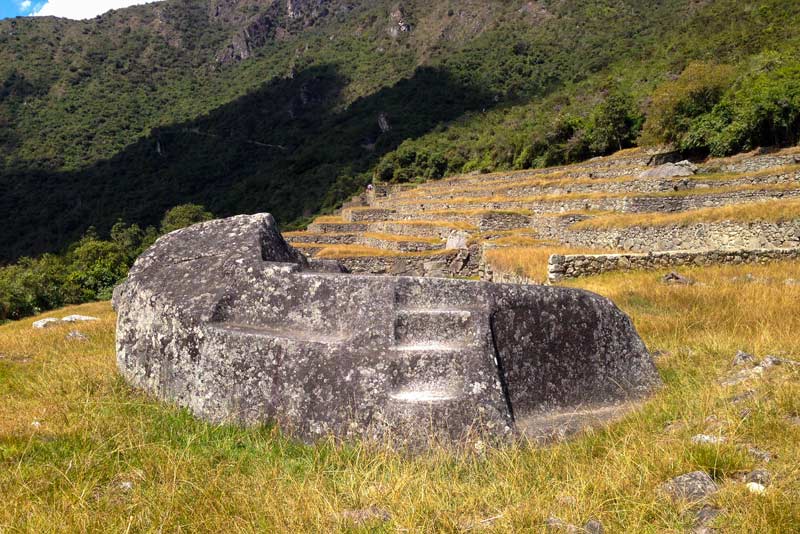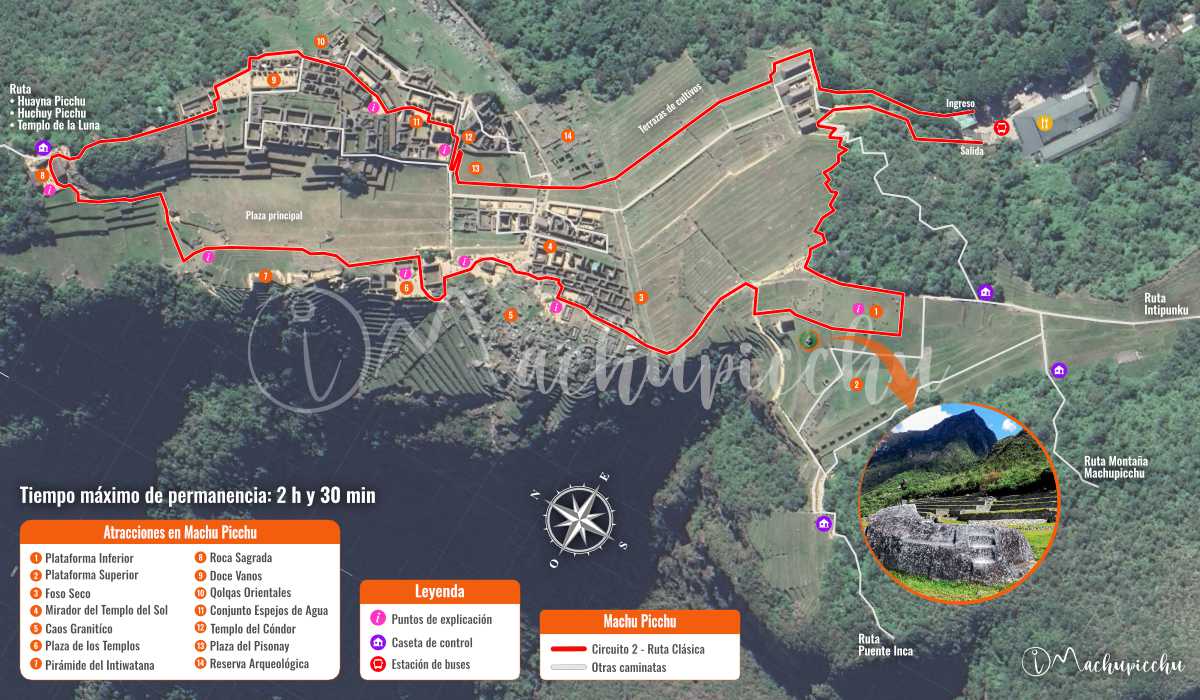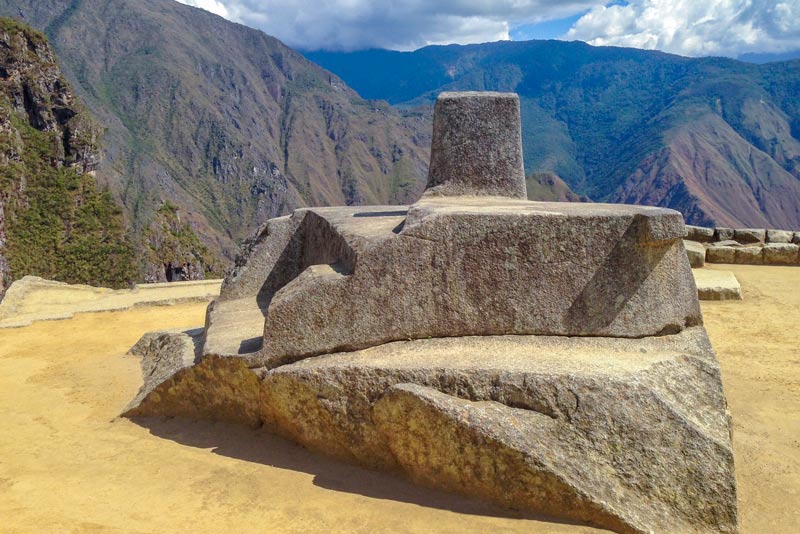Funerary Rock in Machu Picchu
The Funerary Rock of Machu Picchu is one of the lesser-known but no less important buildings in the Inca citadel. It is located a few steps from the House of the Guardian or House of the Watchman, the point where you can get the classic photos during tourist visits. Archaeological research indicates that it was used as a ceremonial table where mummies were embalmed. In addition, it is believed that it also served as a point of astronomical study. To visit it, you must take circuit 2 in the Inca city, which can be done with the Machu Picchu Classic ticket. Learn more!
- Machu Picchu, city and religious site
- The more than 150 constructions of Machu Picchu
- The Funerary Rock in Machu Picchu
- Location. How to get there?
- Which ticket to Machu Picchu to choose? Prices and schedules
- Other important constructions in Machu Picchu
- Questions and answers about the Funerary Rock in Machu Picchu
The most important religious buildings in Machu Picchu
Machu Picchu was a city inhabited by around a thousand people. In addition, it was a religious site where Inca deities were worshipped, such as the sun, stars, mountains, moon, etc. For this, the Incas built temples and shrines. The most important are the Temple of the Sun, the Main Temple, the Temple of the 3 Windows, the Sacred Rock and the Temple of the Condor. Likewise, in the area of the House of the Guardian, where there is a privileged view of the Inca site, they carved a rock in the shape of a ceremonial table or altar where they embalmed the dead and worshipped the celestial gods.
Machu Picchu, city and religious site
- The Inca city of Machu Picchu is presented as one of the most advanced cities of its time, which is why its beliefs are firmly rooted in each and every one of its corners.
- The worship of different deities and the cult of the gods through sacred rituals, in addition to the representation of their culture in their carvings and images spread throughout the city, demonstrate that Machu Picchu was a sacred place for the people who inhabited it, a civilization that saw itself closer to its gods from this sanctuary located in the Andes.
- In the citadel, gods were worshipped through altars and temples carved in fine rock. This is demonstrated by the temples of Machu Picchu such as the Temple of the Sun, the Temple of the Three Windows, the Sacred Rock and more.
- Inside and around these temples, the Incas offered coca leaves, fine textiles and more. They also placed precious objects in their niches or windows, such as gold ceramics, silver statuettes and more.
The more than 150 constructions of Machu Picchu
- Everything indicates that Machu Picchu was built exclusively to house the highest spheres of the aristocracy, within the social scale of the Andean civilization, a fact that has been able to explain the continuous celebrations that were held in the Sacred City for both religious and civic-social reasons.
- These sacred rituals were built to increase the fertility of their farmlands, prayers to invoke different meteorological phenomena, celebrations for the arrival of the warm seasons, as well as ceremonies and sacrifices in honor of the different Inca deities.
- In total, more than 150 stone buildings have been counted in Machu Picchu, including agricultural terraces, Inca roads, smaller enclosures, artisan workshops, common and exclusive dwellings, as well as religious temples. The latter are of the most perfect construction, as are niches and altars for offerings.
- The most important Inca temples are the Temple of the Sun, the Main Temple, the Sacred Rock, the Temple of the Condor, the Temple of the 3 Windows and the Great Cavern, also known as the Temple of the Moon.
The Funerary Rock in Machu Picchu
- The Inca civilization practiced a multitude of disciplines, some of them as important as astrology, meteorology, architecture and medicine.
- They have been able to be understood thanks to their different structures, symbols and buildings, closely related to the disciplines already mentioned.
- The Funerary Rock is one of these symbols so important to this civilization, which represents what we know today as the practice of forensic medicine, since this civilization practiced the preservation of the dead, through mummification.
- The Funerary Rock is located in the agricultural sector of the city, it took its name from different hypotheses by the community of experts, who, after multiple discoveries of graves with human remains, named it in this way.
- The rock symbolically represents the entrance to the necropolis of the Inca city of Machu Picchu.
- Its proximity to the cemetery gave it the status of an idol; it is estimated that the area where it is located must have hosted a large number of funeral rituals and housed the city’s religious offerings.
- The archaeological remains found nearby have been able to explain that the design of the Funerary Rock was made to serve as a chapel or sanctuary of the citadel. This is due to the fact that it presents the common elements of this type of buildings.
- Likewise, you can see a series of steps that form a small staircase, as well as the existence of a large ring.
- Due to its funerary nature, this construction was intended for the mummification process through the procedure of drying corpses to then be embalmed.
- However, other studies have tried to explain that the Funerary Rock also had a close relationship with the study of the cosmos and the stars, in particular, the sun, since its light fell on it during the winter season of the year, a phenomenon that could have been part of the religious beliefs of this civilization.
Location. How to get there?
- The Funerary Rock is located in the Casa del Guardian sector, also known as the House of the Watchman of Machu Picchu. From there you can get a panoramic view of the Inca city, a space famous for obtaining the classic postcard photo.
- From the entrance point to Machu Picchu, you walk 30 minutes along stone steps until you reach this point, located 2,430 meters above sea level.
- Just a few steps from the Watchman’s House, in a garden, is this stone carved in the shape of an altar and with three perfectly carved staircases.
Which ticket to Machu Picchu to choose? Prices and schedules
- The Funerary Rock can be visited if you choose the ‘Classic Machu Picchu’ ticket. This ticket includes circuit 2 of Machu Picchu. This circuit, in addition to the Funerary Rock, includes a visit to buildings such as: the Temple of the Sun (viewpoint from the top), the Main Temple, the Temple of the 3 Windows, the Sacred Rock, the Hall of Mirrors, the Sacred Fountains and the agricultural sector. The ticket also includes a visit to the Guardian’s House, from where you can get the classic photo of Machu Picchu.
These are the prices of the ticket to Machu Picchu that includes the visit to the Funerary Rock:
| Classic Machu Picchu Entrance | ||
|---|---|---|
| Entrance to Machu Picchu | Foreigners | Peru, Colombia, Ecuador or Bolivia (CAN) |
| Adults in general | 152 S/. | 64 S/. |
| University students | 77 S/. | 32 S/. |
| Under 18 years old | 70 S/. | 32 S/. |
And these are the entry times you can choose when purchasing the Machu Picchu Classic ticket:
- Group 1. Check-in is from 6 a.m. to 7 a.m.
- Group 2. Check-in is from 7 a.m. to 8 a.m.
- Group 3. Entry is from 8 a.m. to 9 a.m.
- Group 4. Entry is from 9 a.m. to 10 a.m.
- Group 5. Check-in is from 10 a.m. to 11 a.m.
- Group 6. Entry is from 11 a.m. to noon.
- Group 7. Entry is from 12 noon to 1 pm.
- Group 8. Entry is from 1pm to 2pm.
- Group 9. Entry is from 2pm to 3pm.
- Group 10. Entry is from 3pm to 4pm.
Other important constructions in Machu Picchu
In addition to the Funerary Rock, these are other important constructions in Machu Picchu:
- The Intihuatana – The Intihuatana was an astronomical calendar or sundial built on a rock carved into the highest part of the religious sector of Machu Picchu. It has a small pyramidal shape and an upper sphere whose shadow on the granite predicted the correct time for sowing and harvesting in the Inca citadel.
- The Sacred Rock – The Sacred Rock is a huge stone carved in the north of Machu Picchu. It has a base of 3 meters and a height of up to 7 meters. It also has a shape similar to the slopes of a mountain, which is why it was a place of worship for the ‘Apus’ or gods of the mountains in the Inca worldview. On its bases, some visitors usually leave offerings such as coca leaves.
- The Temple of the Sun – The Temple of the Sun was the most important religious site in Machu Picchu, as it worshipped the sun god or ‘Inti’. It has a semicircular structure and sits on a natural cave, known as the Royal Tomb. It also has fine carvings. Through its windows, the sun’s rays illuminate its interior. It also has niches where offerings of gold, silver and precious stones were left.
Questions and answers about the Funerary Rock in Machu Picchu
1) What is the Funerary Rock of Machu Picchu?
The Funerary Rock is a carved stone in the Guardian House sector of Machu Picchu where the Incas embalmed their mummies and probably worshipped celestial gods such as the sun, stars and moon.
2) Where is the Funerary Rock of Machu Picchu?
The Funerary Rock is located in the Guardian House sector, in the upper part of the Inca citadel.
3) What was the function of the Funerary Rock of Machu Picchu?
The Funerary Rock served as an astronomical observatory and a ceremonial table for embalming mummies in the Inca era.
4) How much does it cost to visit the Funerary Rock of Machu Picchu?
The Funerary Rock is included in the Machu Picchu Classic ticket that costs 152 soles for foreign adults.
5) How to get to the Funerary Rock of Machu Picchu?
To get there, you must leave from the entrance gate to Machu Picchu. Then you must walk for an average of 30 minutes along stone steps until you reach the Guardian’s House area.
6) Can I visit the Funerary Rock of Machu Picchu every day of the year?
Yes, this Inca construction is available every day of the year.
7) Which ticket to choose to visit the Funerary Rock of Machu Picchu?
The Machu Picchu Classic ticket allows you to visit the Funerary Rock.
8) Can I touch the Funerary Rock of Machu Picchu?
No, this Inca construction cannot be touched by visitors. It can only be photographed from a permitted distance.
9) Which Machu Picchu tour includes a visit to the Funerary Rock?
Circuit 2 includes a visit to the Funerary Rock of Machu Picchu.
10) What constructions similar to the Funerary Rock are there in Machu Picchu?
In addition to the Funerary Rock in Machu Picchu, you can visit other similar constructions such as the Intihuatana, the Sacred Rock, the Temple of the Sun or the Great Cavern, also known as the Temple of the Moon.
Advice from people who have been there
 By: Kate W.
By: Kate W.“Excellent trip“
“I traveled to Peru to visit Machu Picchu and I didn’t want to go back. Everything is excellent, the restaurants, the food, the hotels, the kindness of the people, everything. I would go back without a doubt.“
By Ticket Machu Picchu – Last updated, December 27, 2024
